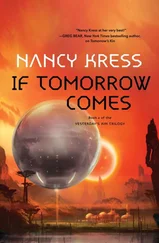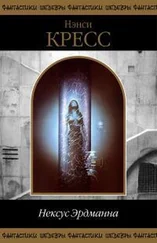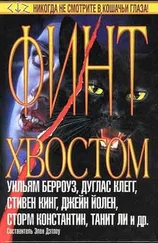Annabel laughs politely, as the woman pauses at last to take a breath and then to say, “My name is Marie St. Clair, by the way. I’m from the Center.”
“Ah!”
This had already been obvious, of course. Annabel knew the woman was from the Center, because of the clipboard—the flowers—the sash. But Annabel keeps her smile in place, and nods with enthusiasm. “Thank you so much for your service,” she says.
“Oh, pah,” says Ms. St. Clair, waving away the gratitude with a happy smile. “It’s my pleasure. My honor, I should say. It’s all just so marvelous, that we are here to see this day. You and I and all of us, everyone now living, we are the fortunate generation, we have heard, and we shall travel through. Marvelous! ”
For a moment, after that, Ms. St. Clair just stands at Annabel’s door, beaming, and Annabel beams back. Because even though this speech of Ms. St. Clair’s is made of the same rote praise-words that Annabel has heard a million times; and despite her wariness of this woman; and despite the desperate secret that has troubled her restless heart for so many years; despite it all, Annabel Lennon feels just exactly what Ms. St. Clair is feeling. They feel it together . They stand there in communal pleasure for a moment, as if under mistletoe. Together they stand in the sunlight coming from the corridor window, and in the pleasure of what is, and in honey-toned anticipation of what is to come.
The truth is, Annabel does think it’s marvelous, and she does feel fortunate to be here, to be alive and in this world at this moment, on this day, she really does.
Behind them, out the corridor window, the city is a mass of black clustered towers, like a group of strangers in overcoats, waiting for a train.
“Anyway,” Ms. St. Clair says abruptly and with force. She takes out a stylus and holds it over her pad. “What I am charged with today, on this penultimate day, is performing a final, final, absolutely final sweep to ensure that everyone has heard.”
“Of course,” says Annabel, and then fears she said it too fast. She renews her smile, takes a breath. “Absolutely. We all have heard. Everyone in our home.”
“There are three of you?”
“Yes.”
“Mother, father, child?”
“Yes. Child. One child. A teenager.”
Quiet, Annabel. Hush. Smile .
“Great!” says Ms. St. Clair cheerily. She jots with her stylus. “And you all know the protocol?”
“Yes,” says Annabel, and bites back the words of course . Everybody knows the protocol. Obviously they know the protocol. Everyone is aware of every detail; for the last ten years all has been known; all has been arranged as it has been commanded. They have learned the protocol from the Center, learned it from one another other, and learned it directly from the source of all truth. Loud and clear.
But Annabel just says “Yes” one more time and widens her smile. She is smiling so tight now that her cheeks hurt. She wonders if this Ms. St. Clair knows somehow, knows the awful truth of their home, and is waiting to pounce. But the dreaded moment never comes. Instead the woman just runs down the protocol one last time—and then Annabel must sign that she has listened and understood. She does. She grips the stylus and she signs. It’s all mildly ridiculous, because of course it will all be gone tomorrow: the clipboard, the corridor, Building 170, all the buildings, these two smiling women as they are standing here now, as corporeal beings in a carpeted hallway.
“Okay, then, I will see you when we’ve all gone through,” says Ms. St. Clair at last, and for just one split second, for half of one half of an instant, Annabel wonders what would happen if she were to ask “ But what if it’s all wrong, what if it’s all just wrong? What if we’re all just nuts? Doesn’t it ever occur to you? ”
But of course Annabel doesn’t say that. Of course she just smiles some more as the woman from the Center slips her clipboard into her satchel and goes, and then Annabel turns and leans against the door with her eyes shut tight and her cheeks burning hot, until she hears her husband’s footsteps coming down the stairs.
• • • •
Goodness no, by the way—the answer is no. It never occurs to Marie St. Clair of the Answer Center that it’s all a mistake, all just a terrible mistake. Such a thought would never appear in her mind.
She is committed and enthusiastic beyond question to the plan, as she has been since the day she was born. Her head is filled with passionate belief that it is right, that it is right, that all of it is just exactly right. She is not unique in this. Most people feel this way. All people, officially.
Ms. St. Clair has been doing this for seven years, since the Answer Center was established—it’s really nine Answer Centers, one in each building cluster, all reporting to the main Center. Marie St. Clair has a chart affixed to the wall in her office, and another up in her rooms in Building 49. Sometimes at night, before falling asleep, she traces the organizational lines with her fingers.
Now, though, she has more to do. She will not sleep tonight. Never again. She adjusts her sash and feels the pleasing weight of the clipboard in her satchel as she glides down the corridor toward the next door.
YOU ARE MY WORK IN THE WORLD, she hears in her head as she walks with serene purpose down the corridor. It’s the voice of God, weaving golden through her mind, like a bright banner flowing between the pillars of a church.
YOU ARE SERVING MY PURPOSE AND PAVING MY WAY.
“I know!” she says, out loud. “I love you.”
YOU ARE MY VOICE YOU ARE MY WORK IN THE WORLD.
“I know!”
It’s 6:15. Ms. St. Clair knocks on the next door down—she is right on schedule. Tomorrow is May 1st. It’s happening! It’s almost here! It’s amazing .
• • • •
“I… have been thinking,” says Kenneth.
The words emerge from him slowly. He is seated at the table with his chin in his hand, and Annabel is at the kitchen island, standing before the great joint of meat, cutting it carefully. She knows what her husband is going to say, what he has been thinking. She is tired of his indecision. She stops cutting and lowers her electric slicer and turns to him and stares.
“You have been thinking what ?”
“Thinking—just—what if we are making a mistake?”
“We are not making a mistake.”
Kenneth sighs and stares at the smooth table. Annabel pushes the button on the slicer and the hot hum fills the kitchen. She is slicing small peels of animal off an enormous slab; the slices curl and fall away. The animal is raw. Under the kitchen table, a fourteen-year-old girl with big black eyes and a thick tussle of black hair is hidden, her knees clutched to her chest, listening and trembling. Annabel keeps cutting. The pieces curl off the flesh and fall in their thin slices into a pile of blood. Kenneth sits in troubled silence at the table, cracking his knuckles. Annabel knows it’s too late now to change course. They’ve made their decision. It’s done.
BRING HER TO ME, says God in Annabel’s head, whispering and vivid and undulant. BRING HER TO ME.
But Kenneth keeps going. “I fear we are making a terrible mistake,” he says, quietly but urgently. “By our deception. A terrible mistake. And it’s not too late, Anna. It’s not too late to take care of this properly.”
“To take care of it properly!”
The euphemism is too much for Annabel to bear. She pivots toward her husband, wielding the still-humming slicer. “You mean bring her to the Center and tell them that she can’t hear! Leave her behind. Abandon our daughter. Our only child! We travel through tomorrow—we go on to Glory—and she stays and rots.” She bares her teeth, jabs the slicer angrily. “That’s what you mean.”
Читать дальше












